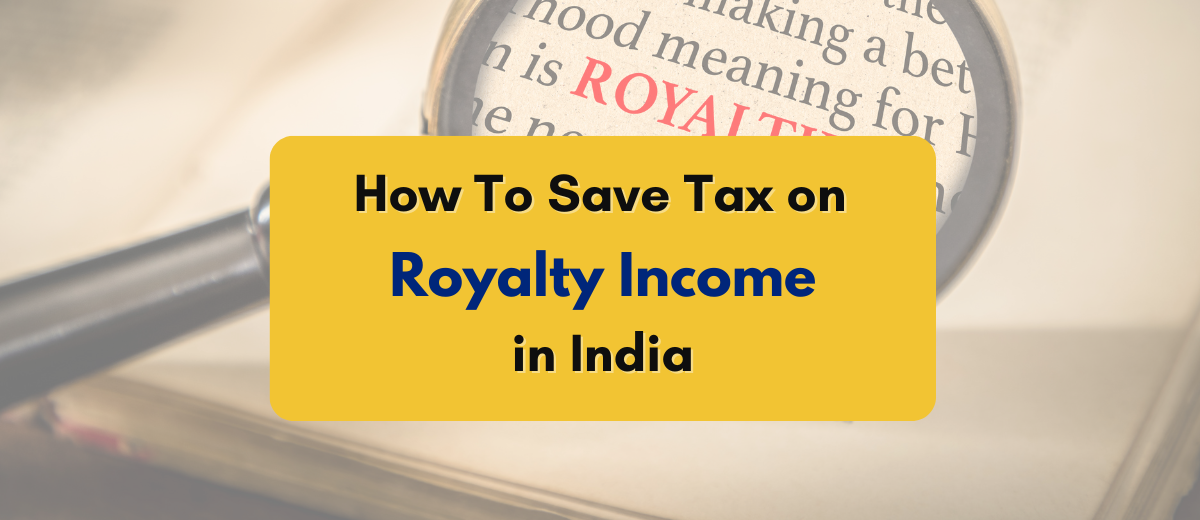Written By – PKC Desk, Edited By – Vijay, Reviewed By – Aakash
Tired of seeing a major chunk of your royalty income disappear as taxes? Wondering how to save tax on royalty income in India? Let us help.
As an experienced tax advisory firm, we bring you the best strategies and practical tips to reduce your tax liability and retain more of your hard-earned income.
Understanding Royalty Income & Its Taxation in India
Royalty income is a primary and substantial source of income for many authors and inventors.
This income, like others, is subject to specific taxation rules. Let’s take a look at these:
Types of Royalty Income
Royalty income arises when a person transfers his or her intellectual property rights to another person. In exchange for this transfer, she/ he receives a one-time lump sum payment or a form of recurring income.
In India royalty income can come from the following sources:

Licensing agreements specify the terms and calculation methods for each type of royalty, including the timing and manner of payment.
Taxation of Royalty Income
INCOME TAX
- Profits and Gains of Business or Profession:If an individual or organization owns a business that generates royalties, the revenue is taxed as part of the business’s overall earnings.
- Other Sources: For individuals receiving royalty payments without a business context (e.g., authors or inventors), it is taxed under “Income from Other Sources.”
TAX RATES
Residents: For Indian residents, royalty income is taxed at slab rates applicable to the assessee.
Non-Residents: Royalty payments made to non-residents are subject to a withholding tax rate (TDS in India) of 20%, as per Section 115A of the Income Tax Act.
How to Save Tax on Royalty Income in India: Top Strategies
There are different ways in which you can optimize taxes in your royalty income:
Deductions Available for Royalty Income
The Income Tax allows for specific deductions on royalty income:
Section 80QQB: Deductions for Authors
This section is applicable to authors of literary, artistic, or scientific works.
Authors can claim a deduction ofINR 3 lakh or the actual royalty income received, whichever is lower.
Conditions:
- The author must be a resident of India (Includes joint author)
- The income must not come from a textbook, journal, newspaper or similar publication.
- Royalty income from abroad must be repatriated within 6 months to qualify for deductions.
- If the royalty is received in a manner other than as lump sum consideration, the eligible income, before accounting for expenses, must not exceed 15% of the value of books sold during the relevant financial year.
- The assessee is required to file Form 10CCD before the due date of filing income tax return to claim deduction.
- The assessee cannot claim any other deduction for the same income if he is claiming deduction u/s 80QQB
Section 80RRB: Deductions for Patent Holders
This section is for individuals who earn royalty from patents registered under the Patent Act, 1970.The said patent must have been registered on or after 1st April 2003.
The deduction is either INR 3 lakh or the actual royalty income received, whichever is lower.
Conditions:
- The individual must be a resident of India and the original patent holder.
- Royalty income from foreign sources must also be repatriated within 6 months.
- The assessee is required to file Form 10CCE before the due date of filing income tax return to claim deduction.
- The assessee cannot claim any other deduction for the same income if he is claiming deduction u/s 80RRB
Other Best Ways to Save Tax on Royalty Income
Apart from claiming the above deductions, here are some other ways on how to save tax on royalty income in India:
Opt for the Old Tax Regime
If you are eligible to claim deductions under Sections 80QQB and 80RRB, consider opting for the old tax regime while filing your income tax return.
Although the new tax regime offers lower tax rates, it does not allow most deductions including the ones discussed above.
Utilize Input Tax Credit (ITC)
If your royalty income is subject to GST, you can claim Input Tax Credit on GST paid for business-related expenses.
This includes GST paid on legal fees, software purchases, or other professional services that can be offset against the GST liability on royalty income.
Utilize Investment-Based Tax Saving Strategies
Opting for the old tax regime allows you to reduce taxable income by investing in tax-saving instruments such as PPF, NSC, ELSS, tax-saving FDs.
These qualify for deductions under Section 80C.
Consult a Tax Professional
Work with a qualified tax advisor or firm like PKC Management Consulting. It ensures you leverage all applicable deductions, exemptions, and credits.
Professionals can also help you structure royalty agreements effectively and manage complex situations, such as international royalty income or GST compliance.
Use Tax Treaties for Non-Residents
Non-residents earning royalty income from India can benefit from Double Taxation Avoidance Agreements (DTAA).
If income earned from certain sources is taxable in the NRI’s country of residence, they can avoid being taxed twice on the same income (i.e., in both India and their country of residence) by utilizing the provisions of the Double Taxation Avoidance Agreement (DTAA) between India and the respective country.
Obtain a Tax Residency Certificate (TRC) and other necessary documents to claim these benefits.
Consider Intellectual Property (IP) Structuring
Structuring intellectual property rights can optimize tax outcomes. For example, holding IP through a company or trust may offer different tax implications compared to personal ownership.
Licensing the IP back to yourself or third parties can help reduce tax liability. But, you need to ensure compliance with Transfer Pricing Regulations when structuring IP in this manner.
Ensure Proper Tax Residency Status
If you are a non-resident, maintaining clear tax residency status can help avoid higher withholding taxes.
Non-residents earning royalties from India should ensure documentation like Form 15CA/15CB is filed to avoid disputes.
Avoid GST on Eligible Royalties
Certain royalty payments (e.g., for original literary or artistic works) may be exempt from GST if copyright ownership is transferred.
Properly classify services under GST rules to avoid any unnecessary taxation.
Plan for Foreign Royalty Income
If you receive royalty payments from abroad, ensure that these amounts are brought into India in convertible foreign currency within six months.
This ensures that you qualify for deductions under Sections 80QQB and 80RRB.
Invest in Research and Development (R&D)
If you are involved in creating new intellectual property or improving existing patents, expenses incurred on R&D may be eligible for deductions.
This not only encourages innovation but also provides tax benefits.
Claim Depreciation on Related Assets
If you own assets related to generating royalty income (like equipment), ensure to claim depreciation on these assets.
Depreciation reduces taxable income and can help in significant tax savings over time.
Plan and Pay Advance Tax
If the total tax liability from royalty income exceeds INR 10,000 in a financial year, you must make advance tax payments in quarterly installments.
Timely payment of advance tax avoids interest penalties under Sections 234B and 234C.
Maintain Proper Documentation
To claim deductions and exemptions, maintain accurate records such as:
- Royalty agreements.
- Payment receipts and invoices.
- Certificates for claiming benefits (e.g., Form 10CCD, 10CCE).
- Proof of expenses claimed as deductions.
Proper documentation is also crucial for avoiding disputes during tax assessments.
Frequently Asked Questions
- Is royalty income taxable in India?
Yes, royalty income is taxable in India under “Income from Business or Profession” or “Income from Other Sources.” Non-residents face a withholding tax rate of 20%, which may vary based on applicable DTAAs.
- What is the rule for royalty deduction?
Section 80QQB and 80RRB aim to provide tax relief to creators of intellectual property. Creators and authors can claim a deduction of the lower of INR 3 lakh or the actual royalty received.
- How to show royalty income in ITR?
Royalty income should be reported under “Profits and Gains of Business or Profession” if treated as business income, or under “Income from Other Sources” otherwise. Make sure to include supporting documentation.
- How to invest in royalty income in India?
Investing in royalty income can be done through publishing books, licensing patents, music and art royalties, or investing in mining rights.
- Are there specific deductions for digital content royalties?
Under Section 80QQB, deductions are not available for income earned from the sale of e-books or digital content. The 80RRB deduction is also not applicable to digital content royalties unless they pertain to patented inventions.

 Expert verified
Expert verified 

